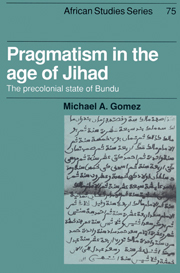Book contents
- Front matter
- Contents
- List of maps
- Acknowledgements
- List of abbreviations
- Notes on spelling
- 1 Introduction
- 2 Malik Sy and the origins of a pragmatic polity
- 3 Consolidation and expansion in the eighteenth century
- 4 External reforms and internal consequences: Futa Toro and Bundu
- 5 The reassertion of Sissibe integrity
- 6 Structure of the Bundunke almaamate
- 7 Struggle for the Upper Senegal Valley
- 8 Al-hajj Umar in Bundu
- 9 The age of Bokar Saada
- 10 Mamadu Lamine and the demise of Bundu
- 11 Conclusion
- Appendices
- Notes
- Bibliography
- Index
- Other Books in the Series
4 - External reforms and internal consequences: Futa Toro and Bundu
Published online by Cambridge University Press: 22 September 2009
- Front matter
- Contents
- List of maps
- Acknowledgements
- List of abbreviations
- Notes on spelling
- 1 Introduction
- 2 Malik Sy and the origins of a pragmatic polity
- 3 Consolidation and expansion in the eighteenth century
- 4 External reforms and internal consequences: Futa Toro and Bundu
- 5 The reassertion of Sissibe integrity
- 6 Structure of the Bundunke almaamate
- 7 Struggle for the Upper Senegal Valley
- 8 Al-hajj Umar in Bundu
- 9 The age of Bokar Saada
- 10 Mamadu Lamine and the demise of Bundu
- 11 Conclusion
- Appendices
- Notes
- Bibliography
- Index
- Other Books in the Series
Summary
The last quarter of the eighteenth century proved to be a critical test for the pragmatism of Bundu. The victory of militant Islam in the neighboring state of Futa Toro would reverberate throughout the Bundunke court and society. Together with the preceding establishment of a reform government in Futa Jallon, Futa Toro's militancy constituted a powerful alternative to the practicalism of Bundu's leadership. The Bundunke ruling elite was both Muslim and Fulbe, as was true of the two Futas, and the three entities enjoyed important economic, religious, and familial relations. Trade routes, clerical traditions and lineages, Muslim schools and peripatetic scholars, and ongoing migratory activity were the principal vehicles through which these three polities were closely linked within a single region. As a result, Bundu was profoundly affected by the Islamic revolution in Futa Toro.
The moderate orientation of Bundu, initiated by Malik Sy, was maintained by Bubu Malik and Maka Jiba. In spite of the establishment of Futa Jallon as a theocratic paradigm by 1747, to which Maka Jiba had personal and lineage ties, the Eliman continued to pursue policies identical to those of his father and grandfather: the development of the productive and commercial sectors of the economy, an acceptance of ethnically diverse immigrants, and a tolerance of non-Muslim communities. The religious leadership originally displayed by Malik Sy (keeping in mind his reputation as an amulet-maker) began to dissipate, and was gradually assumed by the Jakhanke clerisy.
- Type
- Chapter
- Information
- Pragmatism in the Age of JihadThe Precolonial State of Bundu, pp. 74 - 85Publisher: Cambridge University PressPrint publication year: 1993



